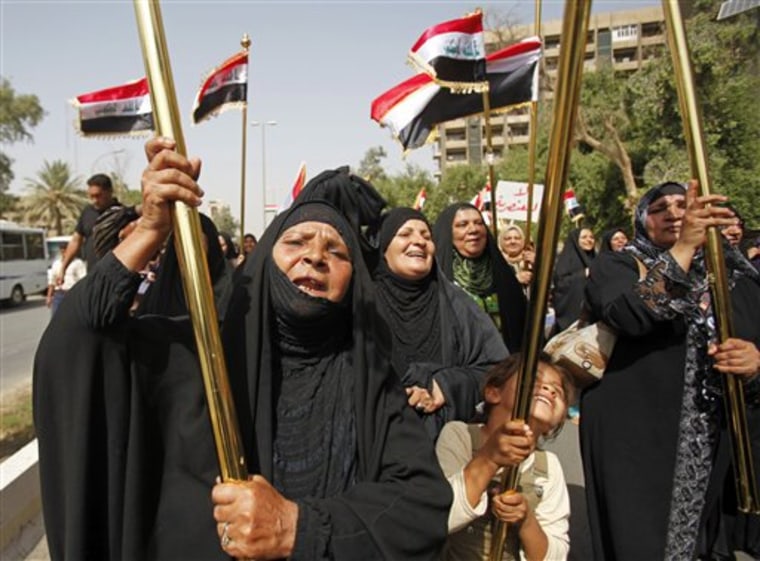Hundreds took to the streets Saturday in parts of Iraq to demand open elections and improved public services, revealing a growing discontent among Iraqis that is overshadowing concerns about the ability of Iraqi forces to take over from withdrawing American troops.
Low oil prices have left the Iraqi government struggling to restore infrastructure after years of neglect, corruption and insurgent attacks, as well as to rebuild their security forces before a planned American withdrawal in 2011.
About 200 demonstrators took to the streets in central Baghdad, chanting: "No water, no electricity in the country of oil and the two rivers," a reference to Iraq's ancient name.
Protester Najim Abid said he and others were calling on the Iraqi government and international aid organizations to take immediate action to improve conditions for Iraqis.
"They must step in and save the Iraqi people, who are suffering because of poverty and deprivation," said Abid, 52, a retired government worker.
The lack of clean water and electricity have proven to be a leading issue in January's national elections for Prime Minister Nouri al-Maliki, who has campaigned on the issue of improved security. In recent days, though, al-Maliki has said rebuilding infrastructure rather than building up Iraqi forces will take priority during the next budget year.
Iraq was twice forced this year to slash its budget from $79 billion to $58.6 billion due to falling oil prices. Its budget next year is expected to be about $70 billion, still well below its funding needs.
Military warns of defense cuts
Iraqi Defense Minister Abdul-Qader al-Obeidi said any defense cuts next year would likely create an obstacle in training and equipping troops. He said Iraq would have to compensate by "caring about quality rather than quantity."
"There is no doubt it affects us," al-Obeidi told reporters during the opening of a new NATO headquarters in Baghdad's fortified Green Zone.
Iraq has more than 640,000 security personnel, with hundreds of thousands still in need of training and, in some cases, equipment. The U.S. military has said Iraq is behind in the purchase of ships and aircraft as well as building a supply chain to keep its soldiers and police armed and resupplied.
Al-Obeidi said Iraq was carefully coordinating the training and equipping of its forces with NATO and the U.S. so it could meet its security responsibilities when U.S. combat troops withdraw by Aug. 31, 2010, under the orders of President Barack Obama.
"We will sacrifice many things for the sake of services because we cannot compare a tank to a hospital," he said.
Protests in two other provinces
Meanwhile, about 800 people in the southern provinces of Wasit and Basra took to the streets in support of a call by the country's most senior Shiite cleric to hold more open elections.
Iraq's parliament has been considering having the Jan. 16 ballots list only the party blocs and not the individual candidates.
Last week, Grand Ayatollah Ali al-Sistani threatened to boycott the elections if the voting system includes only the parties and not the names of the candidates. Al-Sistani wants the so-called "open list" system because he believes it will encourage more voter participation.
